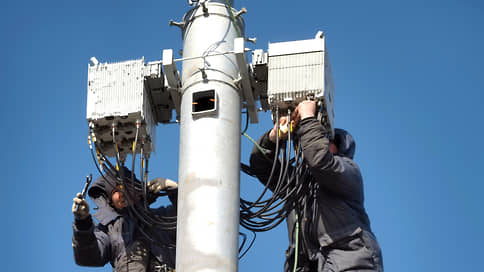New territories are overgrown with communications – Kommersant
[ad_1]

The structure of the Crimean operator K-Telecom, operating in the Zaporozhye and Kherson regions under the +7Telecom brand, received approval from the State Commission on Radio Frequencies (SCRF) to enter the Donetsk and Lugansk People’s Republics. The company received a frequency resource free of charge, but under the terms of the state commission, it must cover priority settlements and routes with communications within three years. Given the lack of equipment, the operator may have to agree on the joint use of networks with Miranda Media, which has also begun construction in new territories, experts suggest.
The +7Telecom mobile communications operator, controlled by the Crimean K-Telecom (Win Mobile brand), received frequencies from the SCRF for deploying communication networks in 2G, 3G and 4G standards in the territories of the DPR and LPR, the company told Kommersant: Now “+7Telecom” draws up documents for obtaining numbering capacity, the tariff plan in new regions is still being formed.
“+7Telecom” is the brand of the operator “K-Telecom” in Zaporozhye and Kherson regions (see. “Kommersant” dated June 6, 2022). The company itself was registered in 2014 in the Krasnodar Territory and is 100% owned by IC Invest JSC, which, in turn, belongs to Pavel Vladislavovich Kuznetsov, follows from SPARK-Interfax data. The company’s revenue for 2022 amounted to 8.2 billion rubles, net profit – 3.2 billion rubles.
Now the Republican Telecom Operator (under the Phoenix brand) and Lugakom (Mobile Communication Systems brand) operate in the Donetsk and Lugansk People’s Republics. Since the beginning of May, the Miranda-Media operator (the Crimean backbone telecom operator, 19.99% owned by Rostelecom) has been operating in the DPR since the beginning of May. At the same time, it is assumed that Miranda Media will become a single operator for all new regions: other market participants should work on the basis of its networks (see Fig. “Kommersant” from March 13).
At the Ministry of Digital Development at the beginning of the year allowedthat “+7Telecom” can enter the DPR and LPR. At the same time, the company was supposed to receive the frequency resource without charging a fee, Deputy Minister Dmitry Kim said in January: “But at the same time, there will be strict requirements for how many base stations, what kind of coverage by year the operator must deploy.”
A Kommersant source familiar with the situation clarified that the frequencies in the new territories were allocated to K-Telecom for three years: “During this time, the company will have to cover priority settlements and routes with communications.
The networks are planned to be launched in the third quarter of this year, followed by a phased fulfillment of obligations within three years.” Under similar conditions, frequencies in the DPR and LPR are allocated, according to him, Miranda-Media: “This will create the necessary level of competition.” The Ministry of Digital Development and Miranda Media did not answer “Kommersant”.
The time to enter new territories and establish the work of +7Telecom there may take about a year, says Dmitry Galushko, CEO of the consulting company Ordercom: “The process will depend, among other things, on the operator’s relations with the owners of the local telecom infrastructure (base stations and backup channels ) — its new operator will be able to rent it.”
The license issued to +7Telecom does not imply the operation of the MVNO model (virtual telecom operator), Alexey Slukin, editor of the profile Telekommunalka Telegram channel, notes: “This means that the company will need to deploy its own infrastructure. From the beginning of planning to the implementation of a large-scale construction, it usually takes two to three years, depending on the supply of equipment, site search, regulatory surveys.” But, he adds, the current situation with the equipment is unlikely to allow +7Telecom to meet these deadlines: “In reality, the project may take much longer.”
According to Kommersant’s interlocutor in the telecom market, cooperation in sharing equipment with a single telecom operator would be a more profitable way: “Building your own network, taking into account sanctions pressure and a shortage of equipment, will take up to five years.”
[ad_2]
Source link





